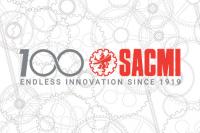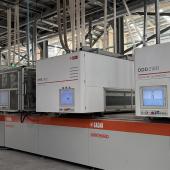New Sacmi Innovation Lab opened

The celebrations for Sacmi’s centenary began on 9 April with the inauguration of the new Sacmi Innovation Lab and the launch of the series of events entitled “Re-thinking the future”.
The celebrations for Sacmi’s 100 years of operations 1919-2019 began on 9 April with the ribbon-cutting ceremony for the Sacmi Innovation Lab, the open-platform facility devoted to the development of know-how and expertise in the field of Industry 4.0 enabling technologies and the Internet of Things.
Co-funded by a regional programme as part of a tender to attract investment in advanced Industry 4.0 sectors (Por Fesr 2014-2020) and a candidate to become a node of the Emilia-Romagna High Tech Network, the new facility is designed to support all of Sacmi’s core businesses (especially automation in the ceramic and packaging industries) and is also an open platform. Together with Protesa (reverse engineering, prototyping) and Iprel (hardware and software design for industrial automation and supervisors), the Lab represents a complete innovation ecosystem at the service of the wider business community. As Sacmi’s Chairman Paolo Mongardi explained, innovation is not just technology but more crucially a social and cultural factor that generates wealth to the extent that it is placed at the disposal of a community.
“In these 100 years of history, Sacmi has scaled the heights of world manufacturing thanks to our people’s ability to recognise and anticipate change and meet the specific challenges of each historical period and socioeconomic context,” noted Mongardi. “To do our part in this delicate period of transformation, we must renew our inter-generational mission and take on new challenges, particularly those relating to sustainability and the circular economy.”
“Re-thinking the future”
The opening of the Sacmi Innovation Lab was held in parallel with the conference “Making space for innovation”, the first of the six events in the “Re-thinking the future” programme. The theme of the series of seminars is the transformation of organisational and business models in the age of Industry 4.0, with talks given by international academics and experts in fields relating to change, artificial intelligence and process digitalisation.
The scientific curator of the programme is Raffaele Secchi, director of the Liuc Business School of Castellanza. In his talk entitled “Megatrends and technological innovation: impact on competitive models”, Secchi noted that by 2030 at least 15% of global GDP will be produced in some 40 megalopolises, mostly in Asia. In this context, the pace of adoption (and therefore obsolescence) has quickened and an enormous new middle-class population is emerging onto the world stage, bringing new skills and consequently new competition.
Discussing the importance of human capital and business training, Andrea Lipparini, Professor of Innovation Management at the University of Bologna and Director of the Executive MBA course at the Bologna Business School, argued that the competitiveness of businesses will depend on their continued ability to attract talented young people.
Luca Maria Gambardella, director of IDSIA, a key international artificial intelligence research institute based in Lugano, Switzerland, discussed the theme of artificial intelligence. According to Gambardella, cutting-edge AI capable of replicating the workings of the human brain is already being applied in the manufacturing industry. And although the impact on human-machine relations in the industry and society of the future are yet to be defined, he pointed out that until now new automation has always created new employment opportunities.
Digital twin: more efficient and sustainable production systems
The conference side of the event was concluded with a talk given by Gildo Bosi, Sacmi’s R&D Automation Manager, who illustrated the activities carried out by Sacmi Innovation Lab. One aspect of particular interest is the ability to develop digital twins, precise digital replicas not just of machines and plants but also of products and the corresponding go-to-market strategies. The result is maximum personalisation at an affordable cost, the ability to solve problems in advance and a capacity to govern production and market scenarios that are already at the project development stage.
The new Lab has a staff of around 40 researchers (including 20 new graduates) and has the important role of training the professional figures needed to manage these future changes efficiently. Because as all the speakers agreed, it is human beings and their capacity to imagine and govern change that will drive the 4.0 technological revolution.
Did you find this article useful?
Join the CWW community to receive the most important news from the global ceramic industry every two weeks




















